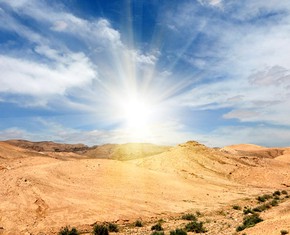The views expressed in our content reflect individual perspectives and do not represent the authoritative views of the Baha'i Faith.
Ye shall know them by their fruits. Do men gather grapes of thorns, or figs of thistles? Even so every good tree bringeth forth good fruit; but a corrupt tree bringeth forth evil fruit. A good tree cannot bring forth evil fruit, neither can a corrupt tree bring forth good fruit. Every tree that bringeth not forth good fruit is hewn down, and cast into the fire. Wherefore by their fruits ye shall know them. – Mathew 7:16-20
In my early Bible education—Lutheran confirmation classes, every Saturday afternoon—we read the “by their fruits” quote from Mathew 7 many times. At first, as a small child, I didn’t understand the metaphor, and visualized Jesus carrying a literal basket of fruit. Hey, give me a break—I was only five! But as I grew older, I began to understand the symbolism a little more, and hear it analyzed and discussed by my pastors and ministers in classes and sermons. The way I learned it, this Biblical passage asks us to evaluate people by what they do, by the results they produce—by their fruit. That seemed reasonable.
But the entire passage, it turns out, really serves primarily as a warning about false prophets. (We didn’t learn that part in our classes…) Here’s the entire verse, from the King James Version of the Bible:
Beware of false prophets, which come to you in sheep’s clothing, but inwardly they are ravening wolves. Ye shall know them by their fruits. Do men gather grapes of thorns, or figs of thistles? Even so every good tree bringeth forth good fruit; but a corrupt tree bringeth forth evil fruit. A good tree cannot bring forth evil fruit, neither can a corrupt tree bring forth good fruit. Every tree that bringeth not forth good fruit is hewn down, and cast into the fire. Wherefore by their fruits ye shall know them. – Mathew 7:15-20.
Here’s another Biblical “false prophets” passage, from the Old Testament, the fifth book of the Torah:
If a prophet, or one who foretells by dreams, appears among you and announces to you a miraculous sign or wonder, and if the sign or wonder of which he has spoken takes place, and he says, ’Let us follow other gods’ (gods you have not known) ’and let us worship them,’ you must not listen to the words of that prophet or dreamer. The Lord your God is testing you to find out whether you love him with all your heart and with all your soul. It is the Lord your God you must follow, and him you must revere. Keep his commands and obey him; serve him and hold fast to him. That prophet or dreamer must be put to death, because he preached rebellion against the Lord your God, who brought you out of Egypt and redeemed you from the land of slavery; he has tried to turn you from the way the Lord your God commanded you to follow. You must purge the evil from among you. – Deuteronomy 13:1–5.
Tragically, the passage above, and other passages about false prophets as well, were misused by the leaders of religion at the time to justify the crucifixion of Christ. The Jewish Rabbinical court called the Sanhedrin, who accused Christ of crimes against the Roman Empire and brought him to stand trial before Pontius Pilate, may have even used this text from the Torah to accuse Jesus of claiming to be King of the Jews. Originally intended as a warning against polytheism (‘Let us follow other gods’), instead these warnings eventually became weapons of religious prejudice, bigotry and persecution.
Even today, though, and despite the historical misuse of these scriptures, some people still worry about so-called false prophets. On a few occasions, when people have asked me about Baha’u’llah, I’ve heard this skeptical question: “How do you know he’s not a false prophet?”
“By his fruits,” I usually say. “Baha’u’llah taught love and peace and unity, just as all the prophets did. He lived a life of service and sacrifice. He brought together the mystical and the practical. He emphasized justice for the poor, compassion for the oppressed and equality for all. He created a progressive, unified global community that transcends boundaries, genders, races and faiths. He taught the agreement of science and religion; he renewed the Faith of God rather than rebelling against it. He urged everyone toward higher and nobler purposes. He promoted the oneness of God, of religion and of humanity:
O contending peoples and kindreds of the earth! Set your faces towards unity, and let the radiance of its light shine upon you. Gather ye together, and for the sake of God resolve to root out whatever is the source of contention amongst you. Then will the effulgence of the world’s great Luminary envelop the whole earth, and its inhabitants become the citizens of one city, and the occupants of one and the same throne… There can be no doubt whatever that the peoples of the world, of whatever race or religion, derive their inspiration from one heavenly Source, and are the subjects of one God. – Baha’u’llah, Gleanings from the Writings of Baha’u’llah, p. 216.
…the divine religions of the holy Manifestations of God are in reality one though in name and nomenclature they differ. Man must be a lover of the light no matter from what day-spring it may appear. He must be a lover of the rose no matter in what soil it may be growing. He must be a seeker of the truth no matter from what source it come. Attachment to the lantern is not loving the light. Attachment to the earth is not befitting but enjoyment of the rose which develops from the soil is worthy. Devotion to the tree is profitless but partaking of the fruit is beneficial. Luscious fruits no matter upon what tree they grow or where they may be found must be enjoyed. The word of truth no matter which tongue utters it must be sanctioned. Absolute verities no matter in what book they be recorded must be accepted. – Abdu’l-Baha, Foundations of World Unity, p. 15.
Baha’is believe that Baha’u’llah is the messenger of God for this new era in human history—but no Baha’i ever insists or demands that anyone else adopt that same belief. In fact, the Baha’i writings forbid the Baha’is from proselytizing or forcing their faith on others. Instead, Baha’u’llah said, everyone should be free to investigate and decide on their own. Instead, using rational proofs and abandoning all prejudices, we each can make up our own minds about what we believe. Instead, Baha’u’llah urged the Baha’is to teach their Faith through the example of their own actions, humbly and gently offering the Baha’i teachings to those who express interest, submitting the proofs and truths of the Baha’i Faith to the seeker, Abdu’l-Baha said, “as if offering a gift to a king.”
You’ve now been offered that gift.
















Comments
Sign in or create an account
Continue with Googleor